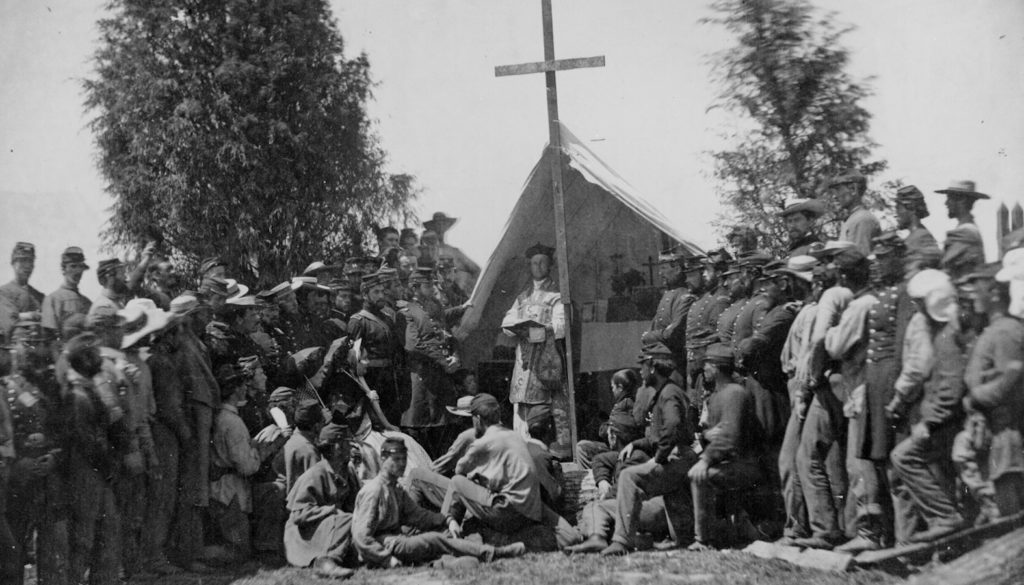There is a great phrase about the American Civil War conveyed by James McPherson, a historian who has written some of that conflict’s best histories. The phrase said the Civil War was a rich man’s war but a poor man’s fight.
Priest and historian Father Robert J. Miller has authored a new book about this old war that shines light on a subject that has been mostly neglected by others. In “Faith of the Fathers” (Notre Dame Press, $45), Miller chronicles the exploits of Catholic chaplains who served the spiritual needs of men on either side of the Mason-Dixon Line. The Civil War had a lot of “firsts” in it, introducing trench warfare, rifled artillery, and even aerial reconnaissance by way of hot air balloons. These new advancements in warfare made possible grotesque escalations in casualties and were a foretaste of the massive carnage the next century had in store.
The Civil War was also the first time Catholic chaplains were officially welcomed into the United States Army. The Confederacy army soon followed. In total, 126 Catholic priests served as chaplains during the war, almost equally divided between the opposing sides.
As the book chronicles, the Catholic population of the U.S. had exploded by the time the Civil War began. In 1790, the Catholic population of America was around 30,000. Sixty years later, it was 1.75 million. Most of it was due to massive amounts of immigration from Ireland and Germany, which were over-represented in both Union and Confederate armies.
The book is more an academic exercise than the grandiose biographical history tomes that make the New York Times’ bestsellers list. But once you get past the annotations and the minutiae of how chaplains were counted and supplied, the book takes us across many battlefields, campsites, and military hospitals where the work of a chaplain was highly needed.
This was an intimate war in every sense, and wounded soldiers from both sides often found their way into the same military hospital. In one of the many personal accounts in the book, a mortally wounded Union soldier was placed side by side with a Confederate counterpart. The Confederate man was a German immigrant. He spoke no English, and he was afraid. The Union Army chaplain assigned to this hospital was a German immigrant and he started to speak to the young man and pray with him. This caused the severely wounded Union soldier to lash out, cursing the priest for comforting the enemy. The priest was undaunted and prayed until the young Confederate soldier died.
A few days later, the priest saw the Union soldier. He was still alive and asked the priest to hear his confession. He wanted to be forgiven for mistreating that young Confederate boy so badly. The priest heard the confession, and then the Union soldier died as well.
You do not have to know a thing about the Civil War to be awed and inspired by the incredible 126 priests you will meet in this book; from hearing confessions for hours, scrounging up wood to make an altar out in the field, or crawling out into an open battlefield to give solace to the dying regardless of what color their uniform was.
There were other challenges besides the horrors of war. There was also opposition from the mainstream American clergy who had strong and unfriendly opinions toward the Church. According to the book, Catholic chaplains were often left to fend for themselves when it came to supplies or finding a reliable horse to keep up with whatever army group they were assigned. Many priests faced pressure “behind the lines” as their bishops forced them back home to tend to their local parishes. In a war that has often been referred to as “brother against brother,” the Catholic priests who bravely served during the Civil War are revealed in this book answering the biblical question over and over again: “Who is my brother?”
Men on both sides believed God was on their side. What we find in “Faith of the Fathers” is 126 Catholic priests helping soldiers understand that they needed to be on God’s side.

